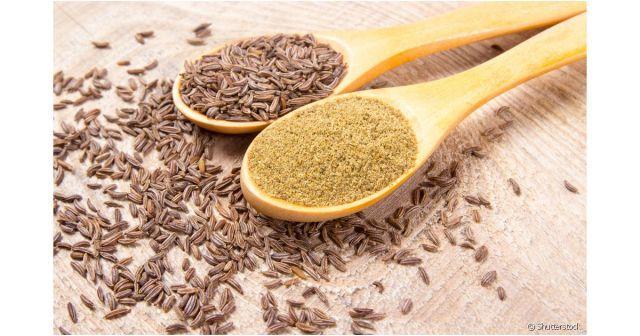
The properties of cumin in colic
Spasmodic and painful contraction of the colon, usually characterized by abdominal cramps or spasms, abdominal colic is quite common, especially in anxious individuals.
Help in this case is given to us by the use of cumin (Cuminum cyminum), the second most used spice in the world after chilli which is indicated in painful gastric and intestinal forms accompanied by flatulence and belching.
Used since ancient times for his beneficial effects on health and for its well-known medicinal uses (not without reason it was included in the culinary recipes of the Romans to aid the digestion of heavy meals), it is experiencing a renewed recognition and appreciation for its therapeutic and culinary properties.
Her semi, similar to those of fennel and anise, with a strong, oily, warm and sweet flavor and with an intense and strong smell, they are rich in an essential oil whose most important fraction is made up of terpenes, such as carvone e limonene which represent the true secret of the digestive and intestinal anti-inflammatory activity of cumin.
In fact, cumin has a significant regulatory action on gastrointestinal function, stimulating on the one hand the gastric secretion (facilitating digestion) and on the other has one antispasmodic and carminative action (eliminates putrefaction gases) useful in colic and abdominal cramps, even of nervous origin.
The seeds are also rich in iron useful for stimulating the secretion of pancreatic enzymes which can help absorb nutrients in the intestine, so much so that in India this spice is known as jiraka (which means "that which helps digestion").
Cumin, whose parts of the plant used are seeds, is sold commercially in the form of dried seeds, powder, essential oil, etc. Let's see them specifically.
The seeds and dust in the kitchen
The seeds, with their digestive and antispasmodic activity, are used whole or ground to flavor meat stews, grills, soups, vegetables, legume-based creams, etc. They can be employed for flavoring sandwiches, scones and quiches.
Compared to powder (another form in which trade is found) it is it is advisable to grind the seeds at the moment of use in order to obtain the immediate release of all the positive substances contained. The ground cumin, if it is not old, it has a stronger aroma than whole seeds.
Always to help digestion, you can prepare asauerkraut salad with cumin in this way: wash 1 kg of cabbage, cut them into thin slices and mix them with 1 teaspoon of cumin, 2 of juniper seeds and 2 teaspoons of salt. Put everything in a jar, pressing with a weight and let it rest for 3 weeks.
Cumin herbal tea
Frequent cause of abdominal colic is the meteorism, in turn determined by the difficulty digesting certain foods which tend to ferment producing gas bubbles which press on the intestinal mucous membranes and cause pain.
To promote the elimination of intestinal gas, counteracting bloating and also helping to relieve abdominal pain, alternate the mallow herbal tea with an herbal tea of "hot seeds”In the following way: in herbal medicine it is possible to have a mix, in equal parts, of aniseed seeds, fennel and cumin. Boil a tablespoon of the mixture in 600 ml of water for 15 minutes, strain and drink two cups a day (especially after meals).
When you want to use a herbal tea for therapeutic purposes, it must generally be taken for a period of 3 weeks (with a break of one) and then again for another 3 weeks.
Cumin is among the 5 carminative herbs against meteorism, discover the others
Caraway decoction
To alleviate the symptoms of swelling, the cumin decoction is prepared by placing 2 g of cumin seeds in 100 ml of cold water and boiling for about 10 minutes. It is served lukewarm, to be taken in a cup before or after meals.
Essential oil
THEcumin essential oil it is a liquid of varying color from light yellow to greenish that manifests a warm, spicy yet delicate aroma.
Able to improve digestion through a increased pancreatic and biliary secretions (antidispeptic properties), just use two drops of cumin essential oil on a sugar cube, once a day.
The additional carminative, antispasmodic and weakly anti-inflammatory actions of this plant extract also allow it to counteract other disorders related to digestive system dysfunctions such as stomach and belly pains. In this case, in two tablespoons of sweet almond oil put 8 drops of cumin essential oil.
Use this mixture to massage the painful areauntil completely absorbed. Cover with a warm woolen cloth and lie down until the disturbance subsides.


























